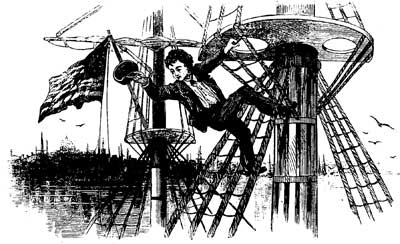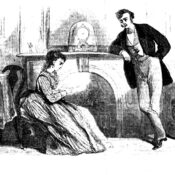The waves of immigrants who flooded across young America were drawn by stories of cheap, plentiful land, good-paying jobs, and those streets with the golden paving stones. There was also the added attraction that they could re-invent themselves. The New World would let them start over with a new identity. They would live and work among people who would know nothing about their ancestors, their reputation, or their past mistakes.
Unfortunately, many Americans found it convenient to re-invent themselves again and again, taking on a series of new identities for fun and profit. In a broad, open land of strangers (long before everyone carried “two forms of identification”) it’s surprising that more people didn’t take advantage of the anonymity of a young country.
They existed, of course. You can often find stories in the early Post about imposters (who pretended to be people who didn’t exist) and impersonators (who pretended to be people they weren’t.) One appears in 1849, entitled “A Strange Case — A Family Deceived As To The Identity Of A Son And Brother”
“A very singular case has occurred in Bangor, Maine, which shows absolute and entire deception of a whole family, neighbors and school mates, as to the identity of a person after a few years’ absence.
“A young man, named Luther Hause, 20 years of age, imposed himself upon the family of James Hause, Esq., of Corrinna, by claiming to be his long lost son, and in that character obtained money and goods to the amount of about one hundred dollars.”
The son of Mr. Hause, named Rowland Hause, had been lost at sea on a whaling voyage. Some time after his disappearance, residents from Corinna, Maine, came across a man named Luther Hause while visiting Bangor. They were struck by the similarity of the name, and they insisted that he was, in fact, Rowland. He told them they were mistaken, but they were convinced and, when they returned to Corinna, told James Hause that his son was alive.
Subsequently, a neighbor tracked down Luther and invited him to return home to Corinna.
“Luther accepted the invitiation. When he reached the house he addressed Mr. and Mrs. Hause as father and mother. Mrs. Hause had some doubts as first, as the color of the eyes and hair of Luther was entirely different from that of her son. She referred to several scars her son had, but Luther showed a scar on his knee, one on his breast, one on his neck, and an overlapping toe, all of which Rowland had.
“He remained at their house some five months and the longer he stayed the more they were satisfied he was their son. Mr. Hause stated that he believed him to be his son just as much as he believed his wife to be his wife. Many domestic circumstances were related by the young man, which they supposed could only have been known to their son, but which the imposter had probably derived from themselves, in the relation of family matters, and after brought forward as a confirmation of his identity.
“Several of the neighbors of Mr. Hause took this young man to be Rowland Hause. Young men, who had been schoolmates with Rowland, talked with Luther about past times, and became convinced that he was Rowland.”
Eventually, the deception bumped into reality.
“A Mr. Dow came to Corrinna, saw Luther, and said that he knew this young man, and his name was Luther Hause, and no mistake, and that he belonged in Troy. Another person recognized him as Luther Hause, and said he had lived by him seventeen years. James Hause began to have doubts.
“To settle the dispute existing in the family and the community as to his identity, a warrant was issued against Luther for obtaining goods under false pretences, since he had got a watch and several other articles while remaining at Mr. Hause’s house.
“He was arrested and examined. Mr. Seth Hause, of Troy, was summoned and appeared at the trial, and there recognized the prisoner as his son.”
In the course of his deception, Luther Hause had gained the support of hundreds of residents in the town, and they appeared at the trial to proclaim their support of the pretender’s claim. Luther could never have offered them solid proof, yet they appear to need much. They were probably swayed by the desire of seeing a lost son returned to his parents. Luther’s defense when the trial began would have disillusioned them.
“the counsel of the prisoner contended that James Hause and his family had deceived the young man, instead of his deceiving them — that when he was first seen in Bangor, he stated distinctly that his name was Luther Hause — there was no pretence that he was any one else than Luther Hause; and that James Hause, if he had opened his eyes to the light around him, might have known that. The Jury, after being out a very few minutes, came into Court with a verdict of Guilty.”
The reporter thought it “strange that such an imposition could be practiced upon a family of the intelligence they are said to possess… Mr. James Hause is said to be an intelligent, a Justice of the Peace, and a man of property.”
But he was also a father, whose son had left his family and his town, travelling far away to join the whalers, to die in the cold Atlantic. Surely James Hause could be forgiven for letting hope sway his reason.
The Post reported the case of another imposter (or would it be impersonator?) operating in Philadelphia in 1857.
“A German woman named Anna Maister is now under arrest, together with her assistant, Caroline Venner, both charged with defrauding a number of persons by representing that she would send their souls to heaven for certain pecuniary considerations.
“Mrs. Maister… represented to her disciples, two hundred in number, that she was the daughter of God and the Holy Ghost, and sister of Jesus Christ. Acting upon their belief of this assertion, she induced them to give to her — as “an offering to God” — considerable money, several silk dresses, silver pitchers, gold bracelets, pencil cases, watches, rings and other valuables.
“On one occasion an assessment of five dollars was levied on each member — notice being given that such was the behest of God in order that Mrs. Maister might have a gold watch and chain, to enabler her to be a fitting companion for Christ, when she ascended to heaven.
“It seems incredible that such a barefaced imposture should obtain credit with even the meanest understandings, but the fact is indisputable.”
Imposters live off the credulity of strangers. But in early America, they were aided by a society that lived in daily expectation of the unlikely, miraculous, or impossible. Didn’t Americans see nuermous stories of unlikely good fortune in the newspapers? Surely, in such a wonderful country, it would be possible to find long-lost children or the sister of Jesus.
But American imposters found they could also take advantage of peoples’ greed and social insecurity.
Become a Saturday Evening Post member and enjoy unlimited access. Subscribe now




Comments
Early Americans got scammed,
Like by Anna, the “sister” of
Jesus, who devoutly flim flammed
The City of Brotherly Love
Folks, by assuring them, if paid,
She’d put in the good word upstairs
For space in heaven to be made.
Many fell for her get saved snares.
Odds are, in Philly to this day,
Imposters like Anna do biz,
Taking the gold and hopes away
From fools. That’s just the way it is.
Ever a sucker for the con,
The “sister” of Jesus lives on.
Many impostors and impersonators gravitate toward centers of power. They often run for political office–and, far too frequently, are elected.